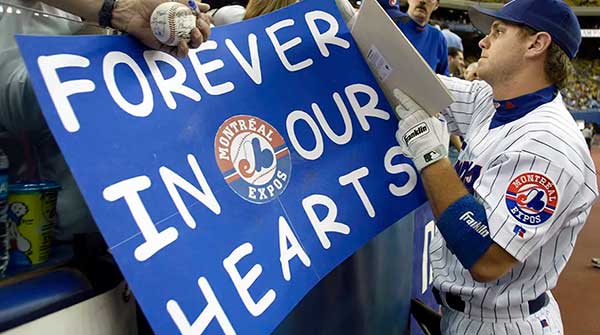The bitter rivalry that changed Canadian baseball
 Watching thousands of Canadian fans stream into T-Mobile Stadium in Seattle to watch the Toronto Blue Jays play the Mariners recently was a stirring sight. Canadians seemed to represent about 60 percent of the crowds. Baseball fans across Canada’s West have made the Jays their team, stretching the Jays fandom from sea to sea to sea.
Watching thousands of Canadian fans stream into T-Mobile Stadium in Seattle to watch the Toronto Blue Jays play the Mariners recently was a stirring sight. Canadians seemed to represent about 60 percent of the crowds. Baseball fans across Canada’s West have made the Jays their team, stretching the Jays fandom from sea to sea to sea.
Sadly, the Jays could not make them happy, as the Mariners staged some improbable comebacks to take the series two games to one from the Jays. But it did little to stem the fans’ enthusiasm for the frustrating Blue Jays, who are battling Seattle for the final wildcard playoff spot in the American League.
For longtime Major League Baseball (MLB) fans in Canada, the excitement for Toronto is a throwback to the days when the Montreal Expos were “Canada’s team” from 1969 to the mid-90s. The extinct Expos were followed rabidly as they became the first Canadian team in MLB and then the first Canadian team to make the postseason.
 |
| Related Stories |
| The enduring allure of baseball
|
| Analytics destroying baseball’s entertainment value
|
| Greed is killing Major League Baseball
|
Spurred by the brilliant Gary Carter, Andre Dawson, Tim Raines, Steve Rogers and Tim Wallach, the ‘Spos of that era captured hearts the way the Jays do now. The national broadcasts of their games were shown across the continent. In Maple Ridge, B.C., young Larry Walker – a future Expo superstar and Hall of Fame selection – chose baseball as a result of the Expos’ influence.
So it seemed only natural that when the idea of Toronto getting an MLB club became a possibility in the mid-1970s that Expos would whole-heartedly push for Canada to double its MLB contingent. After all, two clubs would double the enthusiasm for the sport in Canada, spawning more Larry Walkers in the future.
Little did Montreal president/GM John McHale know that his friendly support for Toronto would end up as the death knell for his Expos franchise in 2005. No one thought that when the Jays began play in the snow of Exhibition Stadium in 1977 that they’d pitilessly cut the economic throats of their cousins down 401 Hwy.
Nothing much happened in the early years of the Expos/Jays “rivalry”. The Expos were entering their first peak seasons, fighting for the National League (NL) East title. Everyone in Canada wanted a piece of the story. In addition to CBC TV showing the games nationally, Montreal also developed a network of local radio stations across the country. We can remember listening to Dave Van Horne doing Expo games on an Oshawa, Ont. station, fighting the static to hear the outcomes. There were similar stations in Ottawa and Windsor, Ont., and a number of other smaller Canadian markets.
The Jays, meanwhile, aligned with CTV as the club was regularly pounded by its American League (AL) East opponents in the early years at the freezing Mistake By The Lake. But even as the team floundered on the field, the owners of the Jays – primarily Labatt Breweries – looked around MLB and noticed that no team was allowed to encroach on the broadcast territory of another club.
As the Jays went from weak sister to equal partner to dominant team on the field, winning the 1992-93 World Series, their tone about letting Expo games generate income in their territory grew less than cordial. Labatt Breweries owned the biggest, most lucrative market in Canada. And only they should profit from it.
This exposed the fundamental weakness of the Montreal franchise. The Olympic Stadium was proving to be a cold, fan-unfriendly disaster. Hundreds of thousands of English speakers had left the province when the Parti Québecois took power. At the same time as initial owner Charles Bronfman was tiring of coming up short on the field and repeated labour stoppages, the Expos were threatened with a severe hit to their broadcast revenues.
Their friendly sharing of MLB in Canada with the Jays now appeared naïve. MLB said the Expos could control Quebec and the Maritimes but would have to stay out of southern Ontario. McHale could see the writing on the wall. Owner Bronfman appealed to then-commissioner Bowie Kuhn for relief, saying this ruling would “ghettoize” the team within Canada. His intention when buying the club in 1969 was to “bring Quebec into the nation”. Instead, the team he’d encouraged to join MLB was freezing the Expos out of the large English-speaking markets.
After hearing from the Jays, Kuhn allowed the Expos to show 15 TV games a season in Ontario. McHale and Bronfman knew this was inadequate. As the Jays started getting into the postseason in 1985 and the Expos sank in the NL, the die was cast. Making it worse, the Canadian dollar began its plunge that ended with a 62-cent dollar versus the U.S.
The 1994 season, in which Montreal had the best record in MLB, was cancelled. Bronfman sold the club to a consortium of owners without Bronfman’s means. By 2000, attendance nosedived as the Expos dumped their great core of Walker, Pedro Martinez, Moises Alou and John Wetteland. By the early 2000s, new American owner Jeffrey Loria was actively trying to sell the team to investors who’d move it to the U.S.
By 2005, the Expos were sold to new owners in Washington who renamed the club the Washington Nationals. Loria, meanwhile, was allowed to buy the Florida Marlins franchise, which he ran into the ground much as he’d done to the Expos.
The Blue Jays, meanwhile, swept in to capture the entire Canadian sports TV audience. They are today valued by Forbes magazine at a cool $2.1 billion. There was talk of transferring the Tampa Bay Rays to Montreal, but that evaporated when local Florida politicians promised lawsuits. MLB is now talking about possibly returning to Montreal as an expansion club should they build a proper ballpark.
Although who in Quebec has a billion to throw at a baseball stadium is unclear. And how they’d get past the Blue Jays’ monopoly on broadcast rights in Canada is also a huge question. Just remember, however, that you needn’t look far to see who had a large hand in killing the Expos.
It was the Toronto Blue Jays.
Bruce Dowbiggin is the editor of Not The Public Broadcaster. A two-time winner of the Gemini Award as Canada’s top television sports broadcaster, he’s a regular contributor to Sirius XM Canada Talks Ch. 167. Inexact Science: The Six Most Compelling Draft Years In NHL History, his new book with his son Evan, was voted the eighth best professional hockey book by bookauthority.org. His 2004 book Money Players was voted seventh best.
For interview requests, click here.
The opinions expressed by our columnists and contributors are theirs alone and do not inherently or expressly reflect the views of our publication.
© Troy Media
Troy Media is an editorial content provider to media outlets and its own hosted community news outlets across Canada.


